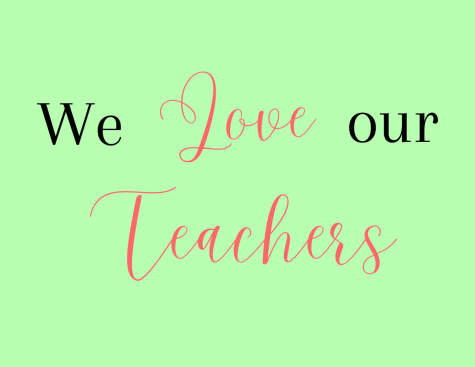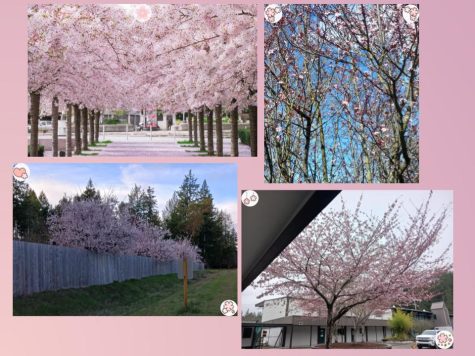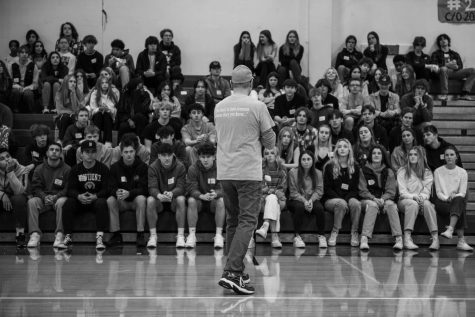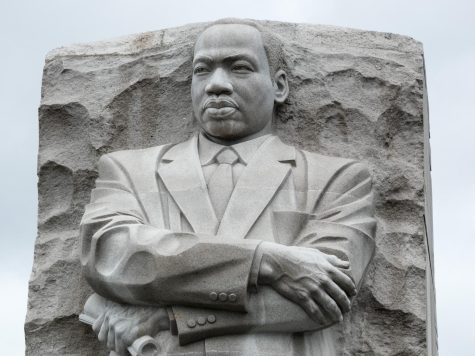Life Balance and Social Interaction As a Teenager
October 7, 2022
Last night, I was in a less desirable position to wake up and do the homework I had set aside earlier in the day. As this isn’t too common for me, I proceeded to get up and read the 12 pages about “Life Balance” assigned to me in my English class. I realize now I am late to recognize the irony of what I had read. To give some background, my day started with an early morning, then school until 2 pm, after which I immediately dove into my three-hour swim practice. I finally left the school at about 5 pm to head home and have dinner with my family, only to finally start my school work at 6 pm.
Below is a pie chart that displays how much time each of these activities take.
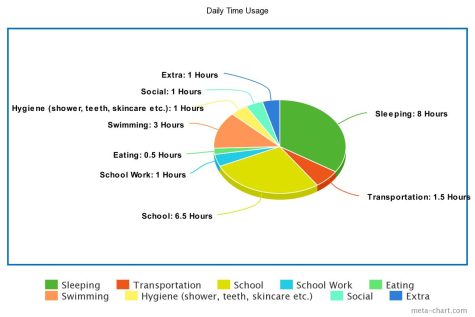
The chart designates a certain amount of time for each activity/necessity. In all honesty, I spend more time during and between each activity than shown on the chart. This chart shows how much time these activities would take if my day were to go perfectly to schedule. Now, all of these daily tasks take place; it’s just a matter of doing each in a timely manner. Recently, the slice of the chart that’s labeled, “Social”, was part of the “Extra” slice, used to pursue personal hobbies. However, being social is just as time-consuming as the rest of it all. In fact, a study conducted by students at Berkeley concluded that social interactions are just as important and necessary to live as a good night’s rest. The data even suggests that a person getting more sleep has a higher prevalence of being social than a person who lacks sleep.
Apart from necessary things like sleep, food, hygiene, exercise, and social interaction, I also attend school every day. Some of the most time-consuming activities, school, school work, and transportation to and from school limit time from other slices of the pie chart and ultimately, my extra slice.
I made this pie chart to figure out exactly how much time I really had each day to do whatever it was I wanted, chore-free. Astounded to learn I only had an hour a day, I wanted to recalibrate how I was using my time, to extend my extra slice for things I wanted to do more often.
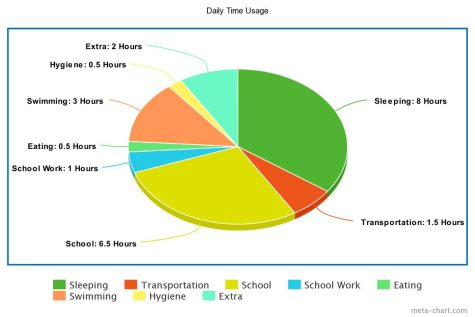
The pie chart above shows the altered version of my daily schedule. First, I limited things I didn’t find as radically necessary as the rest. Instead of seeing friends for lunch and before school, I isolated myself to focus on school work. Since I’d completed that work during the day, I had more time to finish the necessary things when I got home to then settle into whatever I was interested in doing in my free time for the day. Second, I started driving to school to limit my transportation slice. I also spent less time on food prep, eating easy-to-make meals that also helped extend my extra time. With all of these changes, I now had over 2 hours of extra time every day to indulge myself in entertainment and hobbies.
My results? Free time is desirable because it’s something to look forward to. Now I’ve just got time to kill. Rushing through my day, avoiding any luxuries that could cost me extra time, and trying to compensate with a few hours of me-time is draining, emotionally and physically. Downtime shouldn’t be so sought after that you fail to find breaks throughout the day.
After realizing that this new schedule wasn’t practical or healthy, I made changes. I begin using extra time in my day to socialize, and to participate in more lively activities. This changed things drastically. I still had time to relax, yet I wasn’t completely isolated from the rest of the world.
A healthy life balance juggles many elements and needs to result in a worthwhile feeling of fulfillment. Beyond studies and extracurricular activities, I implore each person to find human connections and continue to nurture these relationships. Becoming a person in the present day is unique to each individual, however, a part of this upbringing is making time for connections we have with other people, which is just as needed as the rest of the pie chart.
Works Cited
About the Author Emiliana R. Simon-ThomasEmiliana R. Simon-Thomas, and Emiliana R. Simon-ThomasEmiliana R. Simon-Thomas. “Does Sleeping Well Make Us More Socially Adept?” Greater Good, https://greatergood.berkeley.edu/article/item/does_sleeping_well_make_us_more_socially_adept.
“Mayo Clinic Minute: The Benefits of Being Socially Connected – Mayo Clinic News Network.” Mayo Clinic, Mayo Foundation for Medical Education and Research, 4 Mar. 2022, https://newsnetwork.mayoclinic.org/discussion/mayo-clinic-minute-the-benefits-of-being-socially-connected/#:~:text=Socializing%20not%20only%20staves%20off,connecting%20via%20technology%20also%20works.
“Why Is Sleep Important?” National Heart Lung and Blood Institute, U.S. Department of Health and Human Services, https://www.nhlbi.nih.gov/health/sleep/why-sleep-important#:~:text=Sleep%20plays%20a%20vital%20role,and%20maintain%20your%20physical%20health.



